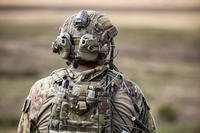Gen. Anthony Clement McAuliffe is best remembered for uttering a single word -- no mean feat, considering that even the shortest Bible verse has two. Commanding the U.S. Army’s beleaguered and surrounded 101st Airborne Division during World War II’s Battle of the Bulge, McAuliffe received a German surrender ultimatum. "Nuts!" he replied, and became a lasting symbol of American courage and determination under fire.
A 1918 West Point graduate, McAuliffe held various field artillery positions before World War II. On the eve of D-Day, McAuliffe jumped with the first wave as a commander of division artillery, although he had never received formal parachute training.
In December 1944, during the siege of Bastogne, Belgium, McAuliffe was acting commander of the 101st in Gen. Maxwell D. Taylor’s absence. The Americans had been holding the Belgian town "at all costs," and on Dec. 22, Gen. McAuliffe received the encouraging news that the 4th Armored Division was beginning its drive north to relieve the 101st. Later that morning, members of the division’s glider regiment saw four Germans coming up the road carrying a white flag. Everyone hoped they were offering surrender. Instead, they presented two pages demanding the Americans’ surrender: "To the USA Commander of the encircled town of Bastogne. . .There is only one possibility. . .the honorable surrender of the encircled town."
McAuliffe glanced at the message and said, "Aw, nuts!" When he told his commanders he didn’t know what answer to send, Lt. Col. Harry Kinnard said ‘That first crack you made would be hard to beat, General." Everyone laughed as a sergeant typed up the succinct response: "To the German Commander: Nuts! The American Commander."
Between this stoic reply, Patton’s troops from the south, and a change in the weather that allowed air reinforcement the following day, the 101st was able to hold Bastogne. Their victory resulted in the first full-Division Presidential Distinguished Unit Citation.
McAuliffe's actions at Bastogne helped assure the final defeat of the Germans. Gen. McAuliffe continued to serve on active duty, including assignments as Head of the Army Chemical Corps, Commander, 7th Army, and Commander-In-Chief of the U.S. Army, Europe, until his 1956 retirement. He died in Washington, D.C. in 1975 and is buried at Arlington National Cemetery.















